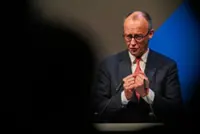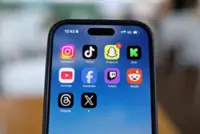LONDON: A 53-year-old woman from northwest England was jailed for 15 months after posting on Facebook that a mosque should be blown up “with the adults inside”. A 45-year-man was sentenced to 20 months for goading his online followers to torch a hotel that houses refugees. A 55-year-old woman was questioned by police for a viral post that wrongly identified the suspect in a deadly stabbing knife attack at a children’s dance class.
These and other people are accused of being “keyboard warriors”, in the words of one British judge, exploiting social media to stir up the anti-immigrant riots that exploded after the suspect was arrested in the fatal stabbings of three young girls at the dance class, in the town of Southport. Their cases have now become examples in a politically charged debate over the limits of free speech in Britain.
With the courts handing down harsh sentences to hundreds who took part in the violent unrest, and calls for the government to strengthen regulation of online content, some argue that authorities risk going too far. Not only are judges locking up far-right rioters, these critics say, but they are also opening the door to a broader crackdown on speech.
The noisiest critiques have come from Elon Musk, the billionaire owner of X, once known as Twitter. After far-right groups used his platform to spread disinformation about the attack and foment the violent disorder that followed, Musk waded into the debate, claiming that civil war “is inevitable” in Britain and attacking Prime Minister Keir Starmer.
“The UK is turning into a police state,” Musk posted Monday, referring to an emergency plan activated by the government to ease pressure on chronically overcrowded jails, under which defendants can be held longer in police cells until space opens in prisons.
A self-described “free speech absolutist”, Musk has ample commercial and legal motives to pick a fight with the British government. But his critique has captured genuine differences in how Americans and Britons view the imperative of protecting speech online.
“Elon Musk does represent a philosophical strand that is very American,” said Sunder Katwala, the director of British Future, a research institute in London. “I think there is quite a big difference in perceived political calculations on free speech between the United States and Britain.”
British authorities, he said, are more willing than Americans to prosecute people for posting what they view as incendiary material. Katwala said polls show that most Britons are worried about the proliferation of “hate speech” and believe that social media platforms should be held to account for propagating it, as well as for the violence that often follows. Outside of right-wing media circles in Britain, where Musk’s feud with Starmer has received admiring coverage, Musk remains an unpopular figure, according to recent polls.
The differences between the two countries on these issues go back a long way. Britain does not have an equivalent of the First Amendment to the Constitution, which sanctifies free speech, though it is a member of the European Convention on Human Rights, which contains a provision guaranteeing free speech. British libel laws give fewer protections to publishers, while privacy laws are stricter.
After the killings in Southport, a judge in Liverpool took the extraordinary step of releasing the name of the suspect, Axel Rudakubana, even though he was not yet 18. The judge said he was trying to curb a flood of misinformation on social media about Rudakubana, who was born and raised in Britain by a Christian family from Rwanda. False claims that he was a Muslim asylum-seeker had agitated far-right thugs, who went on to clash with the police in several cities, besieging mosques and setting fire to hotels used to house asylum-seekers.
For all the cultural differences between Britain and the United States, legal scholars note that at least on the free-speech principles that came into play after Southport, they are not as far apart as it might appear.
“The common law tradition in both countries is that the limits of free speech are reached when it incites people to commit violence,” said Jonathan Sumption, a lawyer and former justice on Britain’s Supreme Court.
That principle, he said, applied in the digital as well as the real world. “I don’t see why the Internet should be regarded as any different than when someone stands on a soap box and addresses a raging crowd,” Sumption said.
But he added that for cultural reasons, American courts might come to different judgments than British ones. “A lot of the outcome depends on the psychology of juries, which may be different in the United States,” he said.
Critics on the right say that the riots could give the government the pretext to clamp down further on free speech. Some Labour lawmakers, they note, have talked about toughening the Online Safety Act, which was passed last year by the Conservative government and imposes new responsibilities on social media companies to remove content that is harmful to children and adults.
The already contentious legislation would give authorities the power to fine technology companies up to 10% of their worldwide revenues and even potentially imprison their top executives for violations.
“Americans have struggled to watch people being sent to prison because of things they’ve put on social media,” said Matthew Goodwin, a right-wing political commentator. “For Americans, this touches upon their almost religious-like commitment to free speech.”
Goodwin contended that Starmer had “framed the riots and protests as being chiefly about disinformation on social media” because it allowed the government to duck deeper social questions over immigration policy.
Critics singled out the case of Bernadette Spofforth, 55, an online influencer and mother of three who was arrested in early August. She was released on bail and has not been charged.
Disinformation researchers say she appears to have been the first to falsely claim on X that the attacker was a Muslim asylum-seeker, in a post suggesting that his name was Ali-Al-Shakati. By the time she deleted the post later that day, it had been viewed almost 1.5 million times and reposted by prominent conspiracy theorists. Spofforth, who has previously spread misinformation about Covid-19 and climate change, told The Sun, a London newspaper, that she had copied and pasted the post, and “fell into the trap of sharing misinformation”.
Some people have also objected to a 15-month prison term for Julie Sweeney, 53, of Cheshire. After seeing a photo on Facebook of people helping repair a mosque that was attacked during a riot in Southport, Sweeney posted: “Don’t protect the mosques. Blow the mosque up with the adults in it.” She pleaded guilty to a charge of sending a communication threatening death or serious harm. Her lawyer argued for leniency, saying she was her husband’s primary caregiver. But the judge, Steven Everett, said, “Even people like you need to go to prison.”
Allegations of incendiary speech are not confined to the right. A suspended Labour Party councilor in Dartford, Ricky Jones, was charged with encouraging a crowd to act violently toward far-right protesters – referring to them as “disgusting Nazi fascists” and saying “we need to cut all their throats” – during a counter demonstration in the London suburb of Walthamstow. Jones has not entered a plea, and his case is expected to go to a trial.
For his part, Starmer has tried to keep the focus on public order rather than civil liberties. As of Aug 18, authorities had made 1,165 arrests and brought 703 charges, according to the National Police Chiefs’ Council.
The prime minister has avoided symbolic gestures like summoning technology executives to 10 Downing Street. But he told broadcasters on Aug 9, “We’re going to have to look more broadly at social media after this disorder.” He also applauded the courts for sentencing people for their online behaviour, not just for taking part in the riots.
“That’s a reminder to everyone that whether you’re directly involved or whether you’re remotely involved, you’re culpable,” Starmer said, “and you will be put before the courts if you’ve broken the law.” – The New York Times





